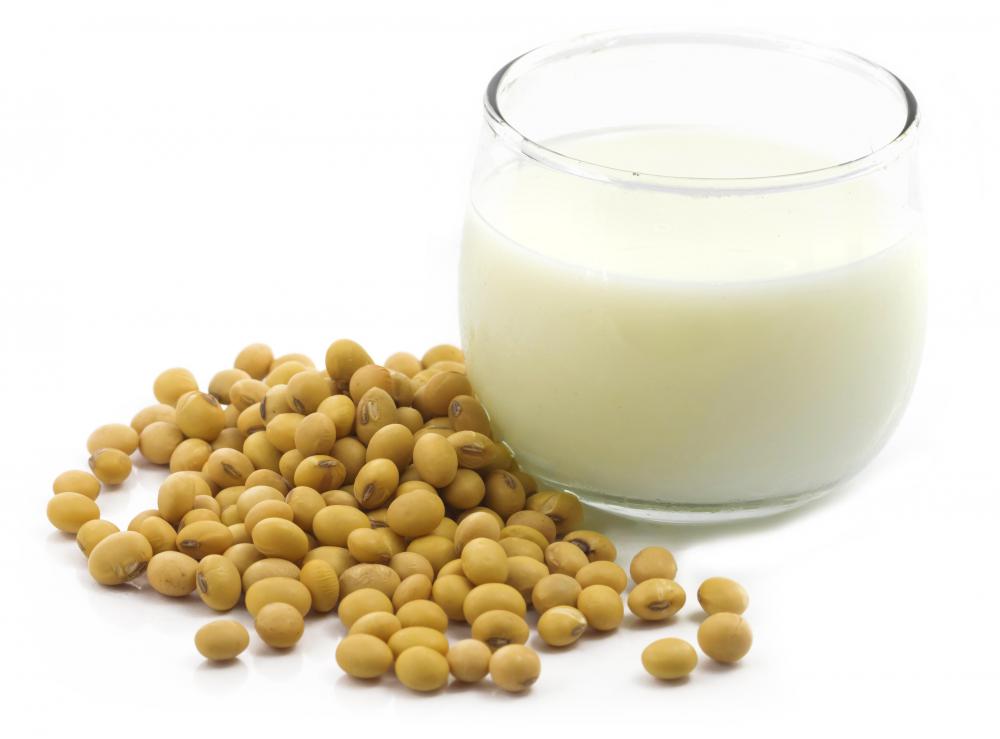At WiseGEEK, we're committed to delivering accurate, trustworthy information. Our expert-authored content is rigorously fact-checked and sourced from credible authorities. Discover how we uphold the highest standards in providing you with reliable knowledge.
What Are Isoflavonoids?
Isoflavonoids belong to a group of compounds called flavonoids, or bioflavonoids, that occur naturally in plants where they serve various functions, for example as the pigments that give flowers and fruits their color. The main plant source of isoflavonoids is legumes, such as various kinds of peas and beans. Isoflavonoids have been shown in research to have certain antioxidant, anti-inflammatory and anti-carcinogenic properties, and are being extensively studied for their potential health benefits in humans. For example, some studies indicate that certain isoflavonoid compounds can help reduce the risk of heart disease and stroke, treat menopausal symptoms, and inhibit the growth of breast- and prostate cancer tumors. Soybeans have a high isoflavonoid content, and various soy products such as tofu, tempeh, and soymilk are good dietary sources of isoflavonoid compounds.
Phytochemicals is a general term used to describe various plant compounds, such as isoflavonoids, that are not vitamins or minerals but are thought to have potential health benefits. The benefits and effects of many phytochemicals are being studied by scientists, but there is no recommended daily intake of such compounds yet. Eating plenty of fruits, vegetables and legumes such as soybeans, chickpeas and green peas will provide many kinds of flavonoid and isoflavonoid compounds.

One much-researched type of isoflavonoid is phytoestrogen, which can be derived from soybeans and is similar to the estrogen produced in the human body. Scientific research indicates that phytoestrogen can be used to prevent and treat certain types of cancer, by blocking the sometimes cancer-causing effects of human estrogen. Phytoestrogen can also be used to treat mild symptoms of menopause. Eating foods rich in soy can have some effect on some post-menopausal symptoms such as hot flashes and osteoporosis, also known as bone loss.

The effects of isoflavonoid compounds on cardiovascular health are also being researched, but the results are inconclusive. Some studies have indicated that isoflavonoids can lower the levels of LDL cholesterol, the so-called bad cholesterol, and also reduce the presence of arterial plaque, which can lead to heart disease and stroke. However, other studies show only minor or no effects at all on cardiovascular health.

Isoflavonoids are mainly extracted from plants, but scientists are also developing new ways of synthesizing isoflavonoids. One such method involves using specifically designed microbes to produce these compounds. In the future, this can make it possible to manufacture large amounts of known isoflavonoid compounds, and also produce new isoflavonoids that have specific medical benefits.
AS FEATURED ON:
AS FEATURED ON:














Discussion Comments
@pleonasm - That's why I think it's great that scientists are isolating isoflavonoids and other substances like this, so that we can just, one day, take a pill in the morning that will do all the disease fighting for us.
I believe people should eat in moderation and that they should have a range of foods. I don't think there's a magic bullet, particularly since everyone is so different. But, I do think that we should try to do as much as we can to extend our lives. Why not? Who doesn't want to live forever?
@indigomoth - I never know what to think about all this talk about the healing power of certain kinds of food. On the one hand, I think people should try to eat as healthily as they can because cancer is a terrible disease and I wouldn't wish it on anyone.
But, on the other hand I think that we worry a little bit too much about trying to perfect our diets. It's not that fashionable to say that you're restricting calories now, but tell people that you're only eating soybeans because of the health effects of soy and they will be right behind you.
We're all going to die. That's a fact. Most of the time, we're only buying ourselves a few more years at the tail end of our lives with all this intense concentration on getting all the right compounds into our bodies. I just don't know if it's truly worth all the fuss.
I was reading an article yesterday about how a lot of our plant foods used to have these kinds of chemicals in them and that over the generations we've slowly bred them out, because they tend to be somewhat bitter.
The article was advocating that people should try to eat more wild plants, like dandelion and purslane, because they had many more isoflavonoids and phytoestrogens and other substances that could help in the fight against cancer and heart disease.
Post your comments